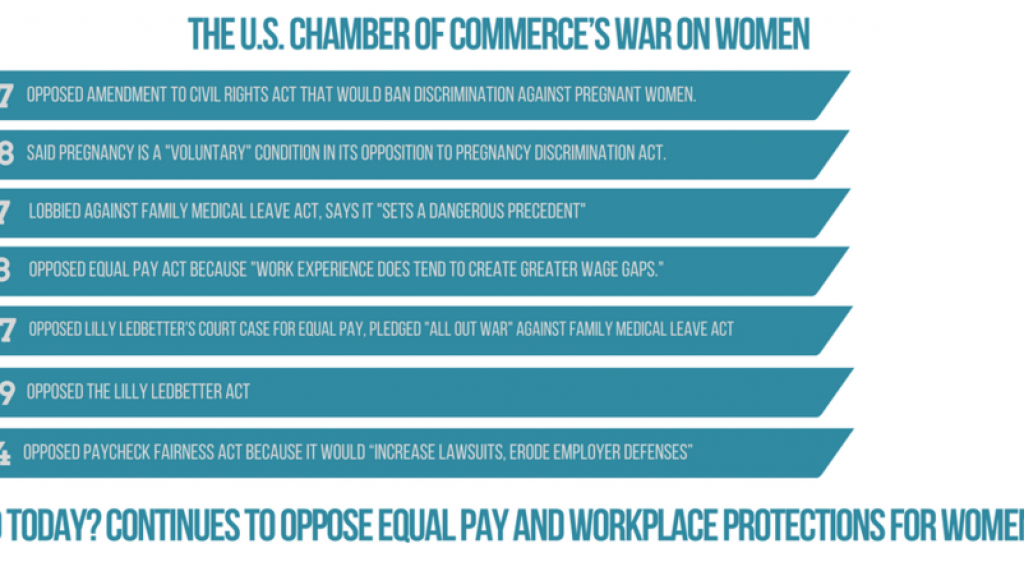The Chamber’s War on Women
You might think that an organization like the U.S. Chamber of Commerce would be supportive of working women. After all, when women enter the workforce, they contribute to economic growth. And the Chamber has made “#LetsGrow” its mantra for 2017.
Unfortunately, you would be wrong. In fact, the Chamber, like some members of the Republican Party it funds to advance its corporatist agenda, has been waging a decades-long war on working women.
Perhaps no other incident epitomizes the Chamber’s attitude towards women better than a blog post on the Chamber website, which has since been deleted and swept under the rug. In this piece, former Chamber Senior Director of Communications Brad Peck asserted that equal pay advocates have “a fetish for money” and that if women didn’t wish to worry about the implications of being paid less than their male counterparts, they should “not overlook the obvious, immediate, power-of-the-individual solution: choosing the right place to work and choosing the right partner at home.” Because, after all, the Chamber’s logic goes, if more women only married well, they wouldn’t have to worry about silly little things like equal pay for equal work. To add insult to injury, the piece was written on the anniversary of the 19th amendment to the U.S. Constitution, which granted women the right to vote.
And while the Chamber may have briefly interrupted what we imagine is a never-ending Mad Men binge-watching party in the office to apologize for the blog post, it has yet to interrupt its lobbying campaign against legislation that would advance equity for women.
Dating back to at least the 1970s, the Chamber has long opposed workplace policies for women relating to equal pay, pregnancy, and medical leave. In 1977 the Chamber lobbied against amending the 1964 Civil Rights Act to cover women from discrimination due to pregnancy. Just a year later, in 1978, the Chamber used the argument that pregnancy is a “voluntary” condition in its opposition to the Pregnancy Discrimination Act. We assume that these Chamber policy decisions were made in a room by people who looked a lot like this.
In 1987, the Chamber warned that the Family and Medical Leave Act would set a “dangerous precedent of federally mandated employee benefits.” What it didn’t mention is that in addition to covering pregnancy-related leave, the FMLA simply allows women to receive wages while recovering from a serious illness, caring for an ill family member, or newborn.
In 1998, the Chamber opposed President Clinton’s push for equal pay, saying that wage disparities are due to the interruption of many women’s careers in order to raise a family, as opposed to discrimination.
In 2007, the Chamber sided with Lilly Ledbetter’s employer in her suit demanding equal pay because the Chamber’s lawyers complained that Ledbetter’s “tear-stained testimony” might prejudice the jury against her employer.
But, the Chamber didn’t stop there: In 2009, it urged members of Congress “to oppose the ‘Ledbetter Fair Pay Act.’” The Lilly Ledbetter Act corrected the 2007 decision by the Supreme Court that required Ledbetter to bring her pay discrimination claim within 180 days of receiving her first unequal paycheck, even though she did not know she was being paid unfairly until years later. The Act clarified that every discriminatory paycheck restarts the 180 day clock to bring a claim. This legislation was a hugely important win for women toward eliminating the gender pay gap.
As if lobbying against a ban on pregnancy discrimination and opposing equal pay for equal work salary wasn’t enough, in 2009, the Chamber went so far as to lobby against legislation that would allow rape victims to bring lawsuits against their employers.
Recent years have not brought about a sudden change of heart and the Chamber continues its war on women. In both 2014 and 2015, the Chamber opposed to the Paycheck Fairness Act, legislation that would address the pay gap by requiring companies to justify pay discrepancies based on legitimate factors such as education, training, and experience. And this year, when the Chamber laid out its labor priorities for the new congress, it stated that while Democrats are still fighting “what they ostensibly see as lingering inequality in wages between men and women,” Republicans should use the opportunity to focus more on anti-retaliation and clarification of employers’ defenses.
When you get right down to it, as far as the Chamber is concerned, receiving equal pay for equal work decreases the profits of the companies that currently engage in gender discrimination. For the Chamber and many of the giant corporations that fund it, inequality is a lot cheaper than closing the pay gap which still remains at 22 cents on the dollar for fulltime, year-round work. The Chamber’s steadfast opposition to equal pay for equal work and other labor protections benefitting women makes us wonder, who really has the “fetish for money?”



